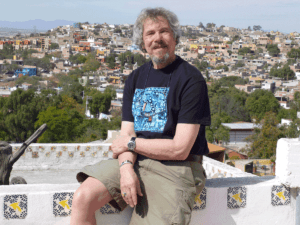
Poetry began as an oral art long ago, a way of crystallizing and condensing language and stories. Today we most commonly encounter it in print, and there is certainly life-changing value in that endeavor, but a great reading adds so much to the nuances of rhythm, music, emphasis and interpretation.
Peter Ludwin has always given abundant readings after the publication of each of his books, and has been featured at venues in Washington, Oregon, California, Nebraska, South Dakota, Minnesota, Ohio and the Czech Republic. These include readings at Whittier College, the University of South Dakota, Central Washington University and community colleges in Port Angeles, Washington and Norfolk, Nebraska. In his experience novice poets often stumble when reading aloud, either because of a monotone, lack of expression, or both. He considers the voice to be its own musical instrument that needs to be practiced just as a piano or guitar would be. More than once after a reading someone has come up to him and said, “You put me right there in your poem.” To him it’s confirmation that he’s doing his job. “You want to take the audience somewhere,” he says, “preferably to a place that leaves them changed.” Whenever he writes a poem he reads it aloud to himself, often multiple times, to get more of a feel for it and decide whether or not it’s working before he considers it “finished”—and even then he knows it’s a draft that likely will require further edits.
Ludwin has given workshops on the persona poem format for Tacoma’s Puget Sound Poetry Connection, the Olympia Poetry Network and Central Washington University. His first persona poem, “Notes for a Sodbuster’s Wife, Kansas, 1868,” is the opening poem for A Guest in All Your Houses. Prior to that it was published in South Dakota Review. After Guest came out “Notes” was featured in The Seattle Times by literary reviewer Michael Upchurch, and in 2012 anthologized in A Face to Meet the Faces, a book of persona poems published in 2012 by the University of Akron Press. Though the persona poem is immensely enjoyable in itself, as well as a marvelous vehicle for stretching boundaries, its greatest value in Ludwin’s view is how it grants the artist permission to be whomever and whatever he or she wants. Thus it enhances our most important faculty: the imagination. Workshop participants have praised Ludwin for his enthusiasm, encouragement and for expanding their horizons.